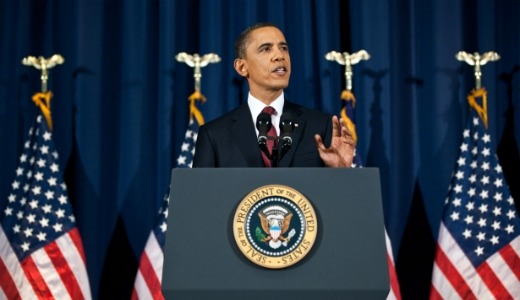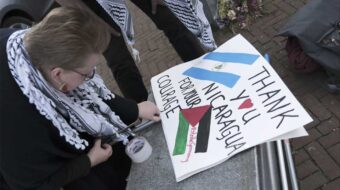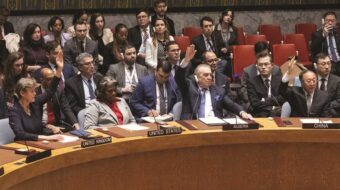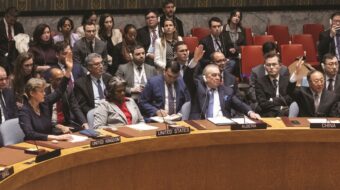
In a televised address, President Obama defended U.S. intervention in Libya and promised to hand over leadership of the No Fly Zone and Libyan humanitarian efforts to NATO by today.
Following last week’s dramatic bombing campaign – in which some claimed the damage to civilians went beyond the UN mandate – Obama proclaimed the tactical objectives of the UN Security Council authorized No Fly Zone a success. He said the campaign has reversed assaults against rebel-led cities by Gaddafi, who had threatened to show “no mercy” to the popular rebellion against his 40-year rule.
A new historical era opened three months ago with the popular uprisings in Tunisia and then Egypt, the first of the “Arab spring.” As the International Peace Bureau says, “these rebellions brought hope to millions and youthful energy to societies suffering decades of repression, injustice, inequality, especially gender inequality and increasing economic hardship. The Libyan revolt was inspired by these largely nonviolent victories.”
But the Libyan crisis rapidly became militarized and is now a full-scale civil war.
President Obama defended the UN intervention, which includes participation from the UK, France, Italy and some Arab League partners, on both strategic and humanitarian grounds and summarized the goals: to secure a UN mandate to protect civilians; stop Gaddafi’s advancing army; prevent a massacre of rebels and establish a No Fly Zone.
The president emphasized, “We have accomplished these objectives consistent with the pledge…that America’s role would be limited,” that troops would not be put on the ground; that responsibility would be quickly transferred to partners.
Strategically, the president argued that a “horrific” massacre of the Libyan opposition would destabilize democratization efforts in both Egypt and Tunisia. It would give a nod to dictators that repressive methods were an acceptable remedy to the democratic upsurge and, that delaying, or failing to act would encourage the “darkest forms of dictatorship”.
On the humanitarian side, the president asserted that the scale of carnage threatened by Gaddafi’s use of force against his people would dwarf similar repressive efforts noted in Bahrain, Syria, and Yemen.
To those who argue that U.S. action is marred by moral (and oil-interest) inconsistencies, the president replied that, in Libya, at this particular moment, international forces were faced with violence on a large scale; that the U.S. and allies had a unique ability to stop that violence: that an international mandate for action had been achieved; that a relatively broad coalition was prepared to join, including the support of Arab countries and a plea for help from the Libyan people themselves; and that the coalition had the ability to stop Gaddafi’s forces without putting American troops on the ground.
The president was emphatic about distinguishing the international effort from “regime change” schemes, which he conceded have had a poor record of success.
Obama admitted that navigating the management of the current complex process without “taking over” a failed state – could be lengthy and uneven.
Following the speech, Secretary of State Clinton flew to London for a conference of foreign ministers of over 35 countries, including Turkey, as well as the top officials of NATO, the United Nations, the Arab League and African Union. The purpose will be to consider an acceptable strategy for maintaining the sovereignty and unity of Libya after Gaddafi. Proposals to assassinate, or “take out” Gaddafi have been rejected. No commitments have been made to supply the Libyan opposition with arms, but that idea is clearly still on the table.
A new twist has been added with the emergence of Al Qaeda as factor in the opposition. This new factor has sparked a fierce debate in Washington on whether to provide arms, reports the New York Times.
The peace movement has condemned the No Fly Zone and all military intervention. They have argued there were unexplored diplomatic alternatives: economic sanctions, electronic jamming or canceled gas and oil sales, for example.
To these critics, Obama argued that all diplomatic efforts were effectively exhausted once Gaddafi reneged on his “cease fire” claim by deploying air power and other atrocities against his own people.
The president closed with a defense of “American ideals” of freedom and leadership. Those ideals are unfortunately marred by the record of interventions that dominated the Cold War years, both Gulf wars and Afghanistan. Most of the dictators in the developing world -including, until recently, Gaddafi – have been “friends” to past U.S. imperial policies.
Nonetheless, President Obama has made a promise to steer a different course, and thus gives hope that we, and the peoples of the world, can find common ground and a more peaceful future.
Image: President Obama delivers speech on Libya. Courtesy White House.












Comments